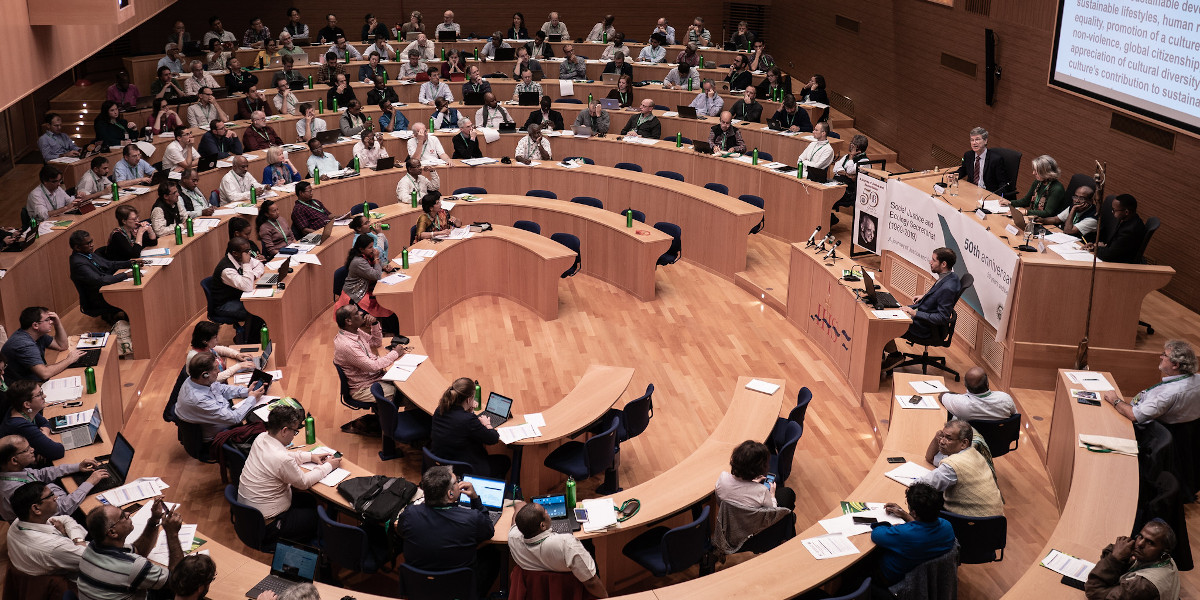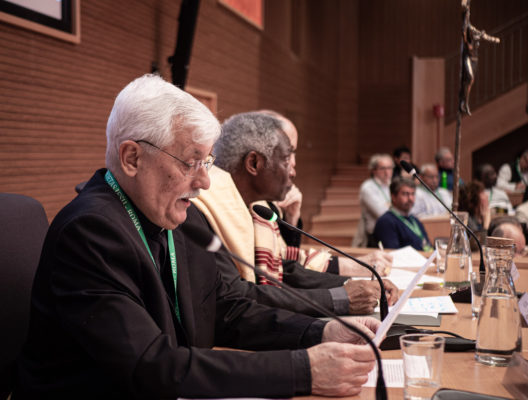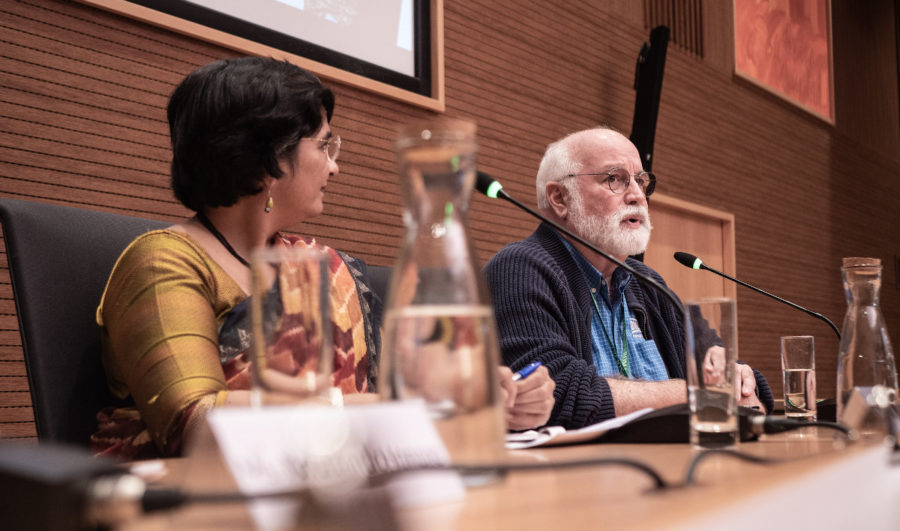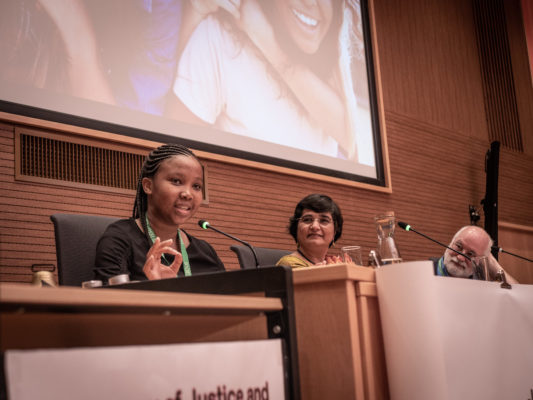 This week, the Society of Jesus is celebrating the 50th anniversary of the Secretariat for Social Justice and Ecology (SJES), born in 1969 at the request of Fr Pedro Arrupe SJ. The anniversary is a kairos, a historic moment for the Society of Jesus to renew its commitment to the mission of a faith that does justice and seeks reconciliation, and a great occasion to reinvigorate its social and ecological dimension.
This week, the Society of Jesus is celebrating the 50th anniversary of the Secretariat for Social Justice and Ecology (SJES), born in 1969 at the request of Fr Pedro Arrupe SJ. The anniversary is a kairos, a historic moment for the Society of Jesus to renew its commitment to the mission of a faith that does justice and seeks reconciliation, and a great occasion to reinvigorate its social and ecological dimension.
Since Monday November 4 until Friday November 8, an international congress is taking place at the General Curia in Rome, with the presence of more than 210 Jesuits, experts and activists from all continents committed to what Pope Francis calls the “peripheries” of the world.
The challenges facing the world today are more complex than those 50 years ago. We are living a change of historical epoch in humanity already visualised by the Second Vatican Council. The gathering is an opportunity to recall the achievements, milestones and lessons learned but also to work on how SJES can best contribute to fostering respect for human rights and fundamental freedoms of the people with whom it works around the world: from the fight against environmental exploitation in Honduras to the rehabilitation of young gang members in the United States; from Dalits or untouchables and indigenous people displaced from their lands in India, to educational challenges with young people in Africa; from the work with migrants and refugees arriving in Europe, to the commitment against climate change.

The inaugural session took place in the Aula Magna of the General Curia in the presence of Fr General Arturo Sosa SJ, Cardinal Peter Turkson, Prefect of the Vatican Dicastery for the Promotion of Integral Human Development, Cardinal Michael Czerny SJ, Under-secretary for Migrants and Refugees, Cardinal Pedro Barreto SJ, Archbishop of Huancayo and Vice-President of the Peruvian Episcopal Conference, and Fr Xavier Jeyaraj SJ, Secretary for Social Justice and Ecology.
“Let us take advantage of this very special moment in which God is once again speaking to us and inviting us to remember, thank, discern and take bold, daring and risky decisions to accompany Jesus and his people in the realities of the frontier, together with the most excluded, poor and vulnerable,” Fr General Sosa said in his opening address.
The first day of the congress was dedicated to the remembrance of the last 50 years. A Eucharist was celebrated in memory of Fr Pedro Arrupe SJ and the 57 Jesuit “martyrs” who have given their lives for the cause of faith and justice in different parts of the world during these five decades. As a tribute to them, SJES announced the publication of “Jesuit Martyrs: Torches of Light and Hope,” which contains a brief portrait of each of the 57 Jesuit martyrs as well as testimonies of people who knew them. The publication can be accessed online for free.

The second day, November 5, focused on discerning the roadmap for implementing the Universal Apostolic Preferences. Julie Edwards, CEO of Jesuit Social Services Australia, moderated the first round table discussion on challenges and opportunities in walking with the excluded. Among the speakers were Jeffrey Sachs, Director of the UN Millennium Project and Assistant to former UN Secretary General Ban Ki-moon. He explained the Sustainable Development Goals and stressed that in a world marked by huge imbalances between rich and poor countries, a redistribution of professionally managed resources could restore justice and prevent illiteracy and disease, but also prevent the death of five million children a year in the most underdeveloped areas of the planet. “The problem is not the lack of resources, but the wrong political decisions,” he said.
Fr Joe Xavier SJ, Director of the Indian Social Institute in Bangalore, commented on Sachs’ report, highlighting the political, cultural and even spiritual difficulties that often hinder the implementation of economic aid. Fr Anold Moyo SJ, Director of Silveira House in Zimbabwe, stressed the importance of caring leadership for the poor.
The second round table discussion moderated by Indian activist Vaishali Patil focused on the challenges and opportunities in accompanying young people on their journey. Fr Gregory Boyle SJ, Founder and Director of Homeboy Industries in California, shared his testimony in accompanying rescued children from Los Angeles gangs. From his experience, only tenderness can help gang kids break out of a life of violence. “All who come to us have an enormous sense of shame, only know violence, and only tenderness can save them,” he said. “We are called to create a place, a community where there is tenderness, where tenderness can replace harm, because a person treated with tenderness can conceive of treating others with tenderness.”

Young South African leader and law student Noluthando Honono raised pointed questions that young people ask of the Church and the Society of Jesus. “As young Catholics, we are tasked with asking questions as to whether the doctrines of the Church speak of the times that we are in,” she said. Particularly, she raised: Where is the place for women in the Church? 2) Why are young people so often missing in dialogues? and 3) The youth to be empowered just needs to be listened to.
All these challenges, she said, are unique opportunities to listen to young people, not to propose solutions, but to ask them how to solve the problems that arise today. “If the Church is a place whose credibility is contradictory, we will simply leave, and if religion and spirituality are contradictory, we will choose spirituality and leave religion,” she cautioned.
Over the next few days, the Congress will focus on the challenges and opportunities to care for our common home and to discern new forms of collaboration. On Thursday morning, November 7, the participants will have a private audience with Pope Francis at the Vatican.
“The celebration does not focus on what we have accomplished in the last 50 years, but on the poor and vulnerable,” says Fr Jeyaraj. “Poverty is a scandal we cannot accept. Our goal is to renew our commitment and reaffirm that we are determined to walk with the poor and recognise the God who suffers with them.”
Watch highlights of the second day of SJES’ 50th anniversary congress

